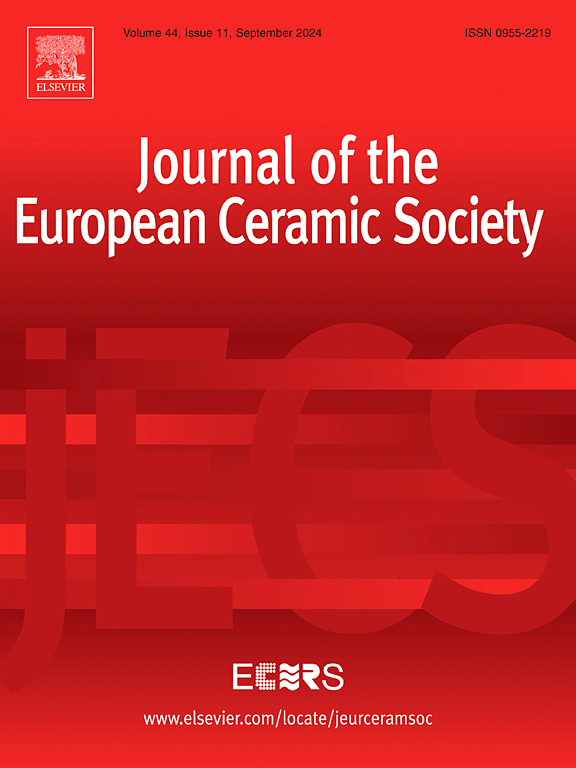采用微型化测试方法确定碳键氧化铝的高温强度
IF 5.8
2区 材料科学
Q1 MATERIALS SCIENCE, CERAMICS
Journal of The European Ceramic Society
Pub Date : 2024-11-05
DOI:10.1016/j.jeurceramsoc.2024.117035
引用次数: 0
摘要
巴西圆盘试验(BDT)和球对三球试验(B3B)均适用于利用微型试样,用于表征由碳键合氧化铝(Al2O3-C)制成的陶瓷过滤材料在高达 1500 ℃ 的温度下的强度。对传统制造的 Al2O3-C 和不含煤焦油沥青的环保型过滤材料进行了研究。为了确定断裂应力和材料强度的 Weibull 分布,使用了有限元模型和最大似然法。通过对断裂表面进行扫描电子显微镜观察,可以了解测试样品的微观结构。结果发现,无沥青 Al2O3-C 的材料强度不如传统的替代材料。与体积相关的 Weibull 应力分布显示,传统过滤材料的单轴强度随着温度的升高呈上升趋势,这与双轴强度相反。本文章由计算机程序翻译,如有差异,请以英文原文为准。
Employing miniaturized test methods to determine high-temperature strength of carbon-bonded alumina
The Brazilian disc test (BDT) and the ball-on-three-ball (B3B) test, both adapted for utilizing miniaturized specimens, are used to characterize the strength of ceramic filter materials made from carbon-bonded alumina (Al2O3-C) at temperatures up to 1500 °C. Conventionally manufactured Al2O3-C and environmentally friendly coal tar pitch-free variations of filter materials are investigated. To determine the fracture stresses and the Weibull distribution of the material’s strength, finite element models and the maximum likelihood method are used. Scanning electron microscopy of fracture surfaces gives insight into the microstructure of tested samples. The material strength of the pitch-free Al2O3-C was found to be inferior to the conventional alternative. The volume-related Weibull stress distributions revealed that the uniaxial strength of the conventional filter materials exhibited an increasing trend as temperature increased, which was contrary to the biaxial strength.
求助全文
通过发布文献求助,成功后即可免费获取论文全文。
去求助
来源期刊

Journal of The European Ceramic Society
工程技术-材料科学:硅酸盐
CiteScore
10.70
自引率
12.30%
发文量
863
审稿时长
35 days
期刊介绍:
The Journal of the European Ceramic Society publishes the results of original research and reviews relating to ceramic materials. Papers of either an experimental or theoretical character will be welcomed on a fully international basis. The emphasis is on novel generic science concerning the relationships between processing, microstructure and properties of polycrystalline ceramics consolidated at high temperature. Papers may relate to any of the conventional categories of ceramic: structural, functional, traditional or composite. The central objective is to sustain a high standard of research quality by means of appropriate reviewing procedures.
 求助内容:
求助内容: 应助结果提醒方式:
应助结果提醒方式:


